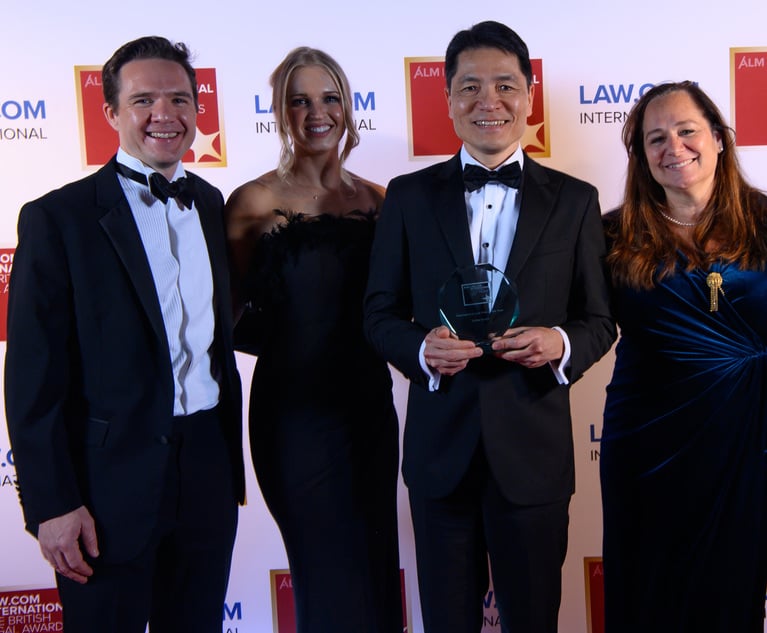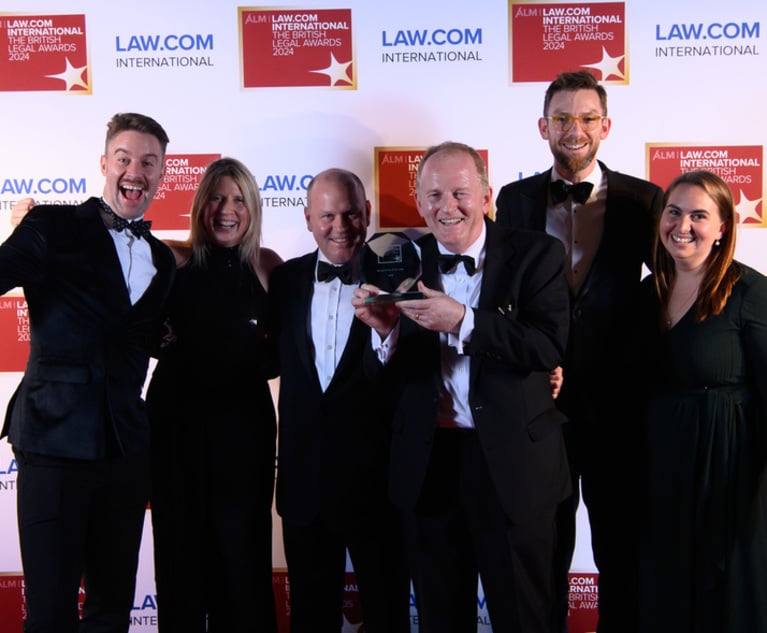Seven Tips For Female Lawyers From Women Who Made it to The Top
Top female lawyers share their advice to younger women in the profession and reveal what they would tell their younger selves.
June 04, 2019 at 05:37 AM
8 minute read

The progression of female lawyers through the ranks remains a hot topic among law firms, with the vast majority of top U.K. firms still lagging behind on gender balance within their partnerships.
But some women have made it to the top of their firms. What advice would they give to junior women making their way in the industry today?
Legal Week sought out the views of some of the most senior female lawyers in the City, including Susan Bright, the regional managing partner at Hogan Lovells, Lisa Mayhew and Therese Pritchard, who jointly run Bryan Cave Leighton Paisner, and Sandra Wallace, the Europe head at DLA Piper.
Seven themes emerged:
 1 – Start networking early on in your career
1 – Start networking early on in your career
Susan Bright, Hogan Lovells regional managing partner for the U.K. and Africa: "My advice to my younger self would be to try to build client relationships right from the start. The people you meet when you start out may end up becoming important contacts later in your career and even instructing you on significant matters. Being successful involves both technical expertise and building a practice and it's never too early to start!
"I would give the same advice to young women starting out today. It's absolutely critical to build those client relationships in order to win work, which in turn supports career progression. It's so much easier to keep in touch with people these days, so it should be a core part of everyone's career development plan. I would also advise women to get involved in key client relationship teams, so that they are in pole position to take on leadership roles in relation to managing those clients over time."
Jay Sadanandan, Latham & Watkins London managing partner: "Make an effort to network, both professionally and socially. Let people see your personality, it will make you happier and help you to build closer relationships."
 2 – Take some time out…
2 – Take some time out…
Therese Pritchard, Bryan Cave Leighton Paisner co-chair: "It's not a race. If you want to cut back for a while, then cut back and come back to work later."
Lisa Mayhew, Bryan Cave Leighton Paisner co-chair: "We both, for periods of our career, have worked part-time or flexibly. These are personal decisions that people make. There is no longer a one-size-fits-all mould. We have 'path to partnership' sessions where men and women talk about their own path to partnership. Lawyers love evidence, so there's no better evidence of having some actual lawyers share their experiences of their own paths."
3 – …But stay in touch
Mayhew: "As someone who grew up in the employment practice, which was [female-dominated], I would say to senior associates going on maternity leave to just keep your toe in. Do not make a long-term decision when life isn't on an even keel. This is a potentially 40-year career, don't just give up on that because the next six months or so are going to be a rollercoaster."
Pritchard: "Work hard, do your best, say what you think, have confidence and stay in touch with some of your girlfriends. They're likely to go in-house and that means that they're going to be the ones doling out work in future."
 4 – Don't put the blinkers on
4 – Don't put the blinkers on
Sadanandan: "When you go through the graduate recruitment process at university, you can spend a lot of time looking for that one perfect job. This can be stressful and result in disappointment if it doesn't turn out to be what you were expecting. Be prepared to be flexible – it's absolutely fine to change your mind or choose a different career path along the way, so you don't have to get it right the first time."
Mayhew: "You also have to enjoy it. If it's not for you, there'll be something else that you enjoy more. Don't put the blinkers on. If you enjoy the job, it shows. People will gravitate to you and clients will see you enjoying learning about their issues. It also applies to colleagues – if you are cheerful and committed, people will want to work with you."
Sandra Wallace, DLA Piper joint managing director for the U.K. and Europe and former U.K. managing partner: "I think that too often we look at others and make assumptions about how perfect everything is for other people. Sometimes this may be true, but everyone has their challenges and their ups and downs. If you can try and understand what others have encountered in their careers, it may help you avoid making the same wrong turn. Or indeed, if you do make a wrong turn, how you can deal with it. Also, if someone does something that really impresses you, tell them and ask how they did it. It's the best form of feedback for that person and you learn from it too."
Kathleen Russ, incoming Travers Smith senior partner: "Remember a career is a long time. It is both OK, and often sensible, to pace your career to accommodate different stages in your life. Talented lawyers can become successful partners at lots of different times in life. You don't need to do everything at once. It is OK to take your time."
 5 – Take risks and say yes
5 – Take risks and say yes
Bright: "It's really important to take the opportunities when they come your way. For example, I had the chance to spend time with a firm in Washington D.C. when I was about three years qualified. That experience proved to be immensely helpful many years later when Lovells and Hogan & Hartson combined to form Hogan Lovells, as I had first-hand experience of the culture of a similar US firm. It's also really important to find individuals who will help you develop your career by acting as sponsors, giving you the opportunities to work on the most challenging, high-profile matters and to advocate for you when you are not in the room."
Sadanandan: "Don't rule yourself out – take every opportunity that comes your way even if you don't think you are 100 percent ready."
 6 – Challenge misconceptions
6 – Challenge misconceptions
Sadanandan: "One common misconception is that a woman is not looking to progress in her career when she has other priorities like starting a family. The two are however not mutually exclusive. It's important to speak up and express your aspirations and goals, particularly as you get more senior and are looking to progress to partnership or other senior positions in the legal industry."
Penelope Warne, CMS senior partner: "There are always misconceptions… it's part of conscious or unconscious bias. The best approach is to be authentic, true to yourself and connect with senior successful women who will support you."
Wallace: "A glaring myth would be that if you work part-time, you're not as committed. I think that the answer is to embed agile working practices within a business and to make sure that it's role modelled at every level. If it becomes the norm for everyone, then it's no longer a 'woman' thing."
Russ: "I find it astounding that there could still be any misconceptions about a woman's ability to progress in the legal industry. I acknowledge that some female lawyers in the City may not want to progress through to partner ranks and may self-select out. But I hope there is no longer any doubt about a woman's ability to progress."
7 – Don't be cutthroat, but be confident
Wallace: "What works is relationships. Also having respect for everyone you interact with. There is no issue with being clear about what you want to achieve and having convictions. Cutthroat is a dying approach. Being true to the right values will beat cutthroat every day.
"You need to have the confidence to back yourself and feel secure enough in your own abilities to open yourself up and learn from others. If someone does something that really impresses you, tell them and ask how they did it. It's the best form of feedback for that person and you learn from it too."
Russ: "Have more confidence in your own abilities. As one of my female partners once said to me: 'Be inspired not intimidated by those around you, but always be yourself. There are lots of different ways to be successful.'
"I also encourage our female lawyers to talk about their successes. This sometimes involves helping them overcome the concern that, to do so, is unacceptable 'bragging'. This is something I have always found difficult myself. But it is hugely important that all our lawyers find a way to talk confidently about their successes, not least as this is an important part of winning work."
This content has been archived. It is available through our partners, LexisNexis® and Bloomberg Law.
To view this content, please continue to their sites.
Not a Lexis Subscriber?
Subscribe Now
Not a Bloomberg Law Subscriber?
Subscribe Now
NOT FOR REPRINT
© 2025 ALM Global, LLC, All Rights Reserved. Request academic re-use from www.copyright.com. All other uses, submit a request to [email protected]. For more information visit Asset & Logo Licensing.
You Might Like
View All
International Law Firm of the Year: A Q&A with Sidley Austin's London Managing Partner
5 minute read
Inside Travers Smith's AI Training, Development Efforts

From Olympic Aspirations to Legal Innovation: Tom Dunlop's Journey to Founding Summize
8 minute readTrending Stories
- 1Law Firms Expand Scope of Immigration Expertise, Amid Blitz of Trump Orders
- 2Latest Boutique Combination in Florida Continues Am Law 200 Merger Activity
- 3Sarno da Costa D’Aniello Maceri LLC Announces Addition of New Office in Eatontown, NJ, and Named Partner
- 4Friday Newspaper
- 5Public Notices/Calendars
Who Got The Work
J. Brugh Lower of Gibbons has entered an appearance for industrial equipment supplier Devco Corporation in a pending trademark infringement lawsuit. The suit, accusing the defendant of selling knock-off Graco products, was filed Dec. 18 in New Jersey District Court by Rivkin Radler on behalf of Graco Inc. and Graco Minnesota. The case, assigned to U.S. District Judge Zahid N. Quraishi, is 3:24-cv-11294, Graco Inc. et al v. Devco Corporation.
Who Got The Work
Rebecca Maller-Stein and Kent A. Yalowitz of Arnold & Porter Kaye Scholer have entered their appearances for Hanaco Venture Capital and its executives, Lior Prosor and David Frankel, in a pending securities lawsuit. The action, filed on Dec. 24 in New York Southern District Court by Zell, Aron & Co. on behalf of Goldeneye Advisors, accuses the defendants of negligently and fraudulently managing the plaintiff's $1 million investment. The case, assigned to U.S. District Judge Vernon S. Broderick, is 1:24-cv-09918, Goldeneye Advisors, LLC v. Hanaco Venture Capital, Ltd. et al.
Who Got The Work
Attorneys from A&O Shearman has stepped in as defense counsel for Toronto-Dominion Bank and other defendants in a pending securities class action. The suit, filed Dec. 11 in New York Southern District Court by Bleichmar Fonti & Auld, accuses the defendants of concealing the bank's 'pervasive' deficiencies in regards to its compliance with the Bank Secrecy Act and the quality of its anti-money laundering controls. The case, assigned to U.S. District Judge Arun Subramanian, is 1:24-cv-09445, Gonzalez v. The Toronto-Dominion Bank et al.
Who Got The Work
Crown Castle International, a Pennsylvania company providing shared communications infrastructure, has turned to Luke D. Wolf of Gordon Rees Scully Mansukhani to fend off a pending breach-of-contract lawsuit. The court action, filed Nov. 25 in Michigan Eastern District Court by Hooper Hathaway PC on behalf of The Town Residences LLC, accuses Crown Castle of failing to transfer approximately $30,000 in utility payments from T-Mobile in breach of a roof-top lease and assignment agreement. The case, assigned to U.S. District Judge Susan K. Declercq, is 2:24-cv-13131, The Town Residences LLC v. T-Mobile US, Inc. et al.
Who Got The Work
Wilfred P. Coronato and Daniel M. Schwartz of McCarter & English have stepped in as defense counsel to Electrolux Home Products Inc. in a pending product liability lawsuit. The court action, filed Nov. 26 in New York Eastern District Court by Poulos Lopiccolo PC and Nagel Rice LLP on behalf of David Stern, alleges that the defendant's refrigerators’ drawers and shelving repeatedly break and fall apart within months after purchase. The case, assigned to U.S. District Judge Joan M. Azrack, is 2:24-cv-08204, Stern v. Electrolux Home Products, Inc.
Featured Firms
Law Offices of Gary Martin Hays & Associates, P.C.
(470) 294-1674
Law Offices of Mark E. Salomone
(857) 444-6468
Smith & Hassler
(713) 739-1250










